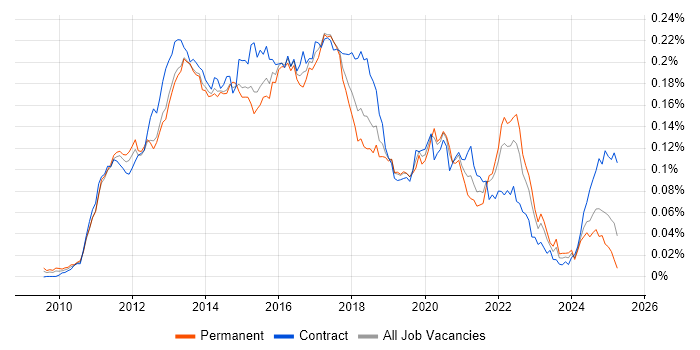Android Software Development Kit (SDK)
UK > England
The table below provides summary statistics and salary benchmarking for jobs advertised in England requiring Android SDK skills. It covers permanent job vacancies from the 6 months leading up to 23 February 2026, with comparisons to the same periods in the previous two years.
| 6 months to 23 Feb 2026 |
Same period 2025 | Same period 2024 | |
|---|---|---|---|
| Rank | 634 | 625 | 742 |
| Rank change year-on-year | -9 | +117 | +136 |
| Permanent jobs citing Android SDK | 2 | 28 | 17 |
| As % of all permanent jobs in England | 0.003% | 0.065% | 0.025% |
| As % of the Libraries, Frameworks & Software Standards category | 0.030% | 0.29% | 0.11% |
| Number of salaries quoted | 1 | 7 | 7 |
| 10th Percentile | - | £60,500 | £51,250 |
| 25th Percentile | - | £65,000 | £63,234 |
| Median annual salary (50th Percentile) | £90,000 | £67,500 | £83,577 |
| Median % change year-on-year | +33.33% | -19.24% | +6.95% |
| 75th Percentile | - | £78,125 | £91,934 |
| 90th Percentile | - | £85,524 | - |
| UK median annual salary | £90,000 | £67,500 | £83,577 |
| % change year-on-year | +33.33% | -19.24% | +11.44% |
All Software Libraries and Frameworks
England
Android SDK falls under the Software Libraries and Frameworks category. For comparison with the information above, the following table provides summary statistics for all permanent job vacancies requiring technical specification, industry standards, software libraries and framework skills in England.
| Permanent vacancies with a requirement for technical specification, industry standards, software libraries and framework skills | 6,666 | 9,663 | 15,198 |
| As % of all permanent jobs advertised in England | 10.96% | 22.32% | 22.70% |
| Number of salaries quoted | 5,113 | 5,968 | 12,913 |
| 10th Percentile | £36,250 | £41,250 | £37,500 |
| 25th Percentile | £50,000 | £51,250 | £47,500 |
| Median annual salary (50th Percentile) | £65,000 | £67,500 | £62,500 |
| Median % change year-on-year | -3.70% | +8.00% | -8.78% |
| 75th Percentile | £85,000 | £87,500 | £82,500 |
| 90th Percentile | £107,500 | £111,250 | £102,500 |
| UK median annual salary | £65,000 | £66,206 | £61,500 |
| % change year-on-year | -1.82% | +7.65% | -8.89% |
Android SDK
Job Vacancy Trend in England
Historical trend showing the proportion of permanent IT job postings citing Android SDK relative to all permanent IT jobs advertised in England.

Android SDK
Salary Trend in England
Salary distribution trend for jobs in England citing Android SDK.

Android SDK
Job Locations in England
The table below looks at the demand and provides a guide to the median salaries quoted in IT jobs citing Android SDK within the England region over the 6 months to 23 February 2026. The 'Rank Change' column provides an indication of the change in demand within each location based on the same 6 month period last year.
| Location | Rank Change on Same Period Last Year |
Matching Permanent IT Job Ads |
Median Salary Past 6 Months |
Median Salary % Change on Same Period Last Year |
Live Jobs |
|---|---|---|---|---|---|
| London | +19 | 1 | £90,000 | - | 8 |
| North of England | -23 | 1 | - | - | 2 |
| Yorkshire | -29 | 1 | - | - | 1 |
| Android SDK UK |
|||||
Android SDK
Co-Occurring Skills & Capabilities in England by Category
The following tables expand on the one above by listing co-occurrences grouped by category. They cover the same employment type, locality and period, with up to 20 co-occurrences shown in each category:
